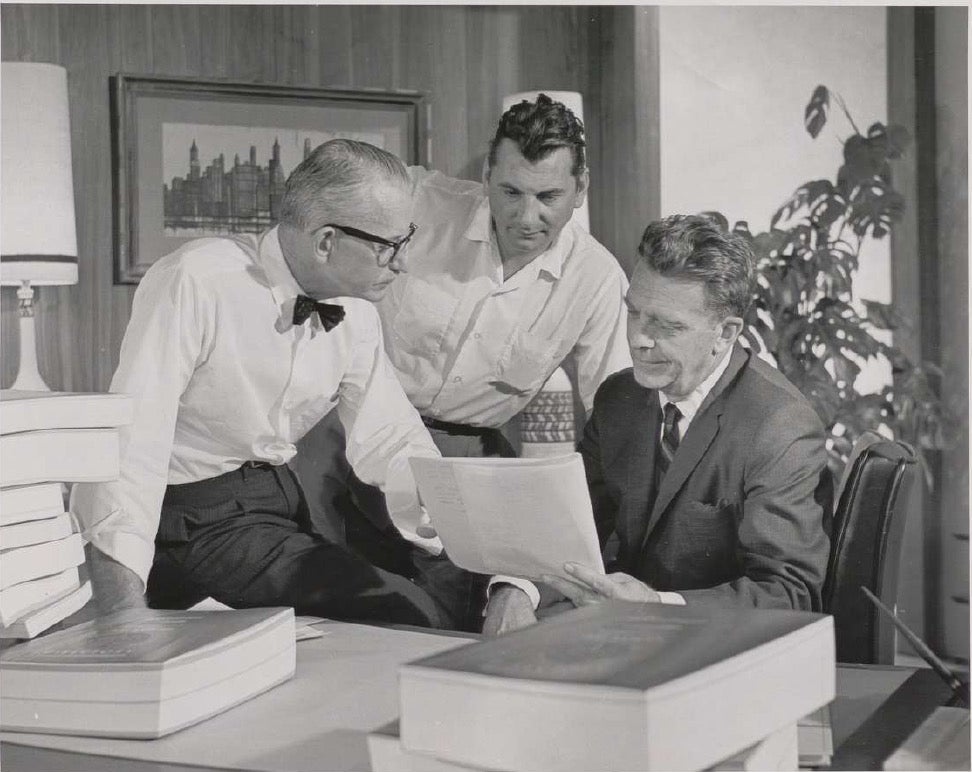POTOCSNY, JULIUS (8 Jun. 1929 - 7 Oct. 2002). Born in Slovakia, Potocsny was the Founder and President of Continental Productions and a Vice-President and Executive Producer with CINECRAFT PRODUCTIONS, both Cleveland-based SPONSORED FILM studios.
While training as a chemical engineer, Potocsny learned to make movies at the University of Art in Budapest and the Hunnia Film Studio, the largest and most significant sound film studio in Hungary until its nationalization in 1948.
In Hungary, Potocsny made a prize-winning documentary and worked on another likely contender when the Hungarian revolution broke out in Budapest. Although Potocsny had no active part in the fighting, his name showed up on a list of people to be arrested, and he escaped to Austria. Shortly after, he smuggled himself back into Hungary disguised as a member of a German soccer team whose coach he knew, to collect his wife, Katalin Patai, and 6-month-old daughter. The family immigrated to Ohio as Hungarian refugees in 1956, and became U.S. citizens in 1962.
In 1957, Potocsny took a job as a research chemist in Cleveland while he studied English. In 1959 he started Continental Productions, a sponsored film studio. Continental merged with Cinecraft in 1962.
Potocsny directed three award-winning sponsored films while he was in Cleveland, partnering with script writer FRANK SIEDEL on all three.
- Steel by Stopwatch (1960), a color, 27-minute film he directed for Jones & Laughlin Steel Company. The film tells the story of steel making by the oxygen lance process. The film won a top award in the documentary field at the Venice and Edinburgh Film Festivals. In 1964 it was also awarded a “Golden Eagle” award in the Business, Education, and Medicine category at the CINE (Committee for International Nontheatrical Events) meeting in Washington, DC. Musicians from the Cleveland Philharmonic orchestra recorded the film’s background music. At the time, Potocsny was President of Continental Films.
- Search (1964), a color, 21-minute film he directed for Youngstown Sheet & Tube Company while at Cinecraft. The film explores steel production's research and development side, specifically the scientific experiments and creative thinking that allowed Youngstown to manufacture cutting-edge steel products. Zoltan Rozsnyai, the first assistant conductor of Leonard Bernstein's New York Philharmonic, wrote the scores played by the 70-piece CLEVELAND PHILHARMONIC ORCHESTRA. Prominent voice actor Alexander Scourby narrated the film. The film won a CINE “Golden Eagle Award” in 1964 and was selected for entry in international film festivals. “Search” premiered at the ALLEN THEATRE in Cleveland and was entered in the Venice and Edinburgh (Scotland) film Festivals.
- Invitation to Ohio (1965), a color, 30-minute film produced by Cinecraft for the OHIO BELL TELEPHONE COMPANY in cooperation with the Ohio Development Department. The movie was designed to attract new industries to Ohio and to encourage existing industries to expand. About 400 scenes from all over the state appear in the film. The film starred two Hollywood actors: Wally Cox (Mr. Peepers) and John Dehner. Musicians from the Cleveland Philharmonic Orchestra recorded the film’s background music.
An article in the PLAIN DEALER in 1972, “Film Makers’ Thanks to the City,” noted that “Potocsny’s reach always exceeded his grasp and after quite a few successful if fairly costly pictures (including one documentary in which he wrapped a camera in asbestos and poked it right into a steel furnace so the audience could watch it seethe), he and Cleveland parted company amicably." The article states Potocsny was in Cleveland for the Allen Theatre showing of Adrift, a film he produced. Adrift was an adaptation of Hungarian novelist and playwright Lajos Zilahy’s book, Something Is Adrift in the Water. The film tells the story of a happily married fisherman who becomes obsessed with an amnesic girl he rescues from a river.
Potocsny also worked as the cinematographer for "Four Men and a Coffin" (1996) and cinematographer and director for "Talk to Me" (1982).
He died in Houston, Texas, on 7 Oct. 2002.
Jim Culley


